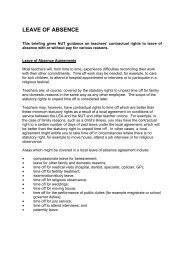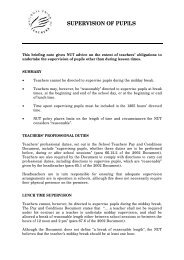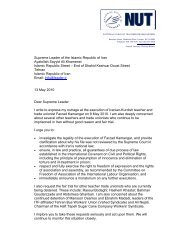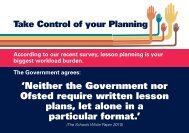Reducing Teachers' Workload â A Way Forward - National Union of ...
Reducing Teachers' Workload â A Way Forward - National Union of ...
Reducing Teachers' Workload â A Way Forward - National Union of ...
You also want an ePaper? Increase the reach of your titles
YUMPU automatically turns print PDFs into web optimized ePapers that Google loves.
These teachers were more likely to complain about their hours, rather than simply comment<br />
on them. Many were making plans to retire or leave the pr<strong>of</strong>ession. Some feared marital or<br />
family difficulties. Teachers with families commented that it is bad when one’s partner is not<br />
a teacher (because they do not understand) but arguably worse when he or she is (since then<br />
no-one spends any time with the children). Many appeared physically “ground down”.<br />
Paradoxically, one <strong>of</strong> the schools in our sample with the most depressed teachers had recently<br />
achieved a massive turn around in its reputation and results. However it had just dawned on<br />
the staff that the exceptional effort <strong>of</strong> the previous few years would now be required for the<br />
foreseeable future if the good results were to be maintained.<br />
None <strong>of</strong> the schools we visited were close to collapse, as some inner city schools are reported<br />
to be. Many however had standing teacher vacancies that they could not fill (including<br />
promoted posts in some cases).<br />
One case which stands out in our mind is a school which had employed a Bulgarian national<br />
with no degree, nor for that matter any recognised teacher training qualification, on “long<br />
term cover” for a post which had proved repeatedly impossible to fill. Although this<br />
arrangement had worked surprisingly well, there remained day-to-day difficulties over<br />
language and culture that were difficult to overcome.<br />
Although not strictly relevant to our study, difficulties in teacher supply have a real bearing<br />
on the workload within, and general morale <strong>of</strong>, a school. Schools that are repeatedly unable<br />
to fill vacancies satisfactorily place increasing loads on existing staff, who then may leave in<br />
turn, exacerbating the problem.<br />
There are signs <strong>of</strong> a particularly worrying polarisation in the South East. Some schools<br />
cannot appoint teachers because <strong>of</strong> the doubtful reputation <strong>of</strong> the school and the perception <strong>of</strong><br />
the kind <strong>of</strong> pupils it serves (even when this reputation and perception are undeserved). Other<br />
schools, with excellent reputations, cannot recruit teachers because the local cost <strong>of</strong> housing<br />
is too high. As prices <strong>of</strong> desirable properties continue to rise, anecdotally there seems a real<br />
danger <strong>of</strong> these two groups <strong>of</strong> schools “meeting in the middle” – so that, in a cruel parody <strong>of</strong><br />
Groucho Marx’s remark about gentlemen’s clubs, a newly qualified teacher would not want<br />
to work in any school that served an area where he or she could afford to live. Only a few<br />
schools – basically, those in expensive areas within an hour’s travelling time <strong>of</strong> a depressed<br />
area – are likely to find teacher recruitment straightforward.<br />
NUT/ATL 19 <strong>Reducing</strong> Teacher’s <strong>Workload</strong>
















